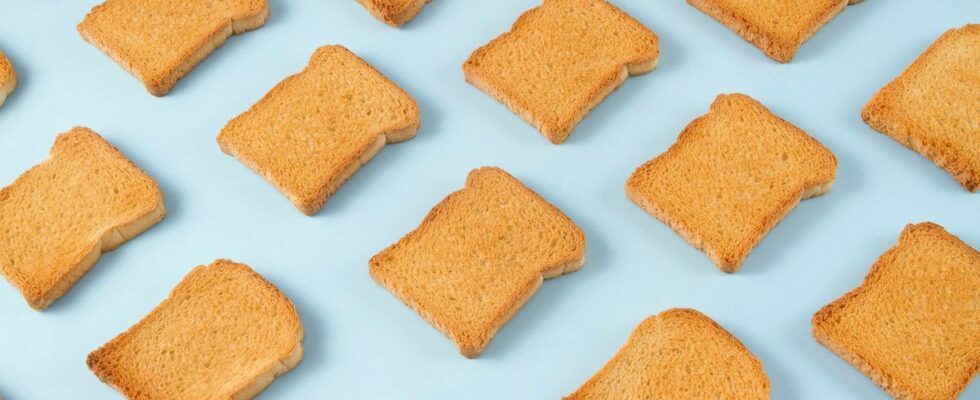Published on
Updated
Reading 3 min.
Contrary to what one might believe, a rusk, toast or burger bun sold in a store is not such a basic food that one does not take care to decipher the labels. Not all packets are the same, recipes may contain excess sugar or salt while the Nutri-Score is not always obvious.
These are the kind of foods that we buy (almost) with our eyes closed as we imagine that they are basic and simple recipes. However, they are far from being that harmless from a nutritional point of view, according to the latest report from the consumer association, the CLCV.
Not always innocent additives
If we have known for a long time that industrial sandwich bread poses a problem due to its high content of sugar and additives, in the bread products section, the survey carried out between 2019 and 2024 by the consumer association and unveiled this Monday 20 May, shows that it is unfortunately not the only industrial food with which we must take the precaution of examining the nutritional table.
Take the rusks. At first glance, it’s just a dry, toasted slice of bread. Why should we doubt the nutritional quality of such an elementary food? Because contrary to appearances, rusks can be loaded with salt. If their nutri-score varies from A to E, 35% have a score labeled C and 31% D. In the same way, recipes can contain excess sugar.
Beware of excess sugar!
A truth that we must also be aware of when it comes to grilled and toasted bread. The CLCV recommends in particular to be attentive to the type of sugars used because it may be dextrose or glucose-fructose syrup. Another example: crunchy toast.
The consumer association detected no less than 12g of sugar per 100g in the LU brand Gourmet Cracottes while the fiber portion is one of the lowest in the sample, i.e. 2.3g per 100g. “It is not easy for the consumer to quickly judge the products at the time of purchase. Indeed, products that are very similar in appearance and visual appearance can have very different nutritional profiles.“, explains the CLCV. The latter also invites consumers to carefully look at the nutritional tables of burger buns, which may contain a high sugar content.
Decipher health claims!
Produced using data from the Oqali Food Observatory which collected 1740 products for the study of 18 families in total by the CLCV and which compared the evolution of the nutritional qualities of 148 references between 2019 and 2024, this The report nevertheless highlights the positive points. And this concerns the removal of palm oil in 34% of products which contained it in 2019 but also a reduction in the number of additives in 36% of families which contained the most.
However, it is important to remain vigilant before choosing a pack of rusks or toast without getting caught up in the supposed nutritional benefits. Clearly, health claims should be taken with a grain of salt. We are talking about terms such as “reduced in sugar” or “low in salt”. It is all the more important to take a step back from the display of products as only 57% of products in the bread section display a Nutri-Score. In other words, just because a packet of rusks boasts of containing reduced sugar foods doesn’t mean its nutritional profile is commendable.
NO to diets, YES to WW!
Make Nutriscore mandatory
The CLCV therefore asks manufacturers to “commit to the Nutri-Score approach and continue efforts to reformulate recipes by reducing the use of additives as much as possible, eliminating palm oil and reducing as much as possible the quantity of sugar, salt and saturated fatty acids“.
She also calls on the European Commission to “make the Nutri-Score compulsory in Europe as soon as possible and the public authorities to strengthen regulations on the use of nutritional and health claims by prohibiting their affixing on products with a poor nutritional profile (Nutri-Score D and E)“.
